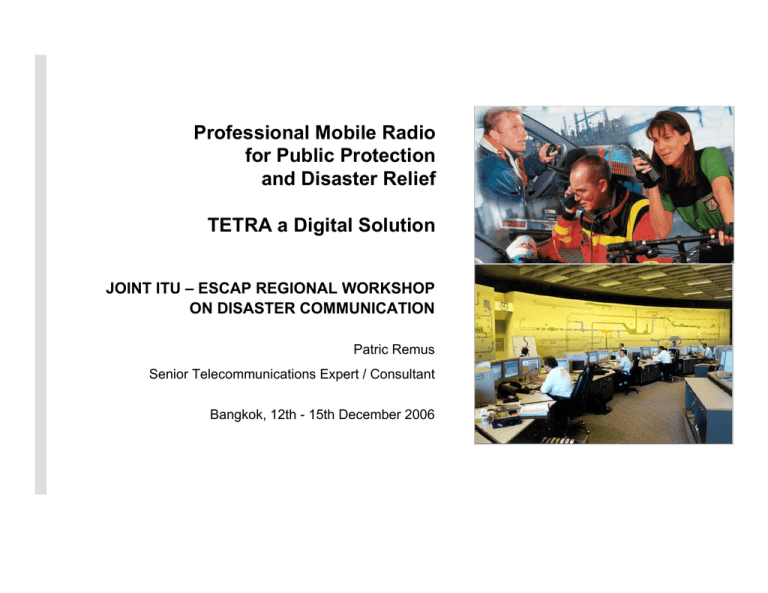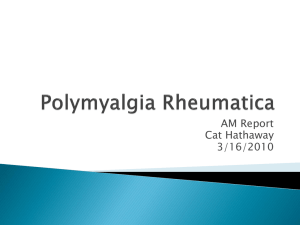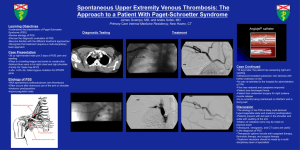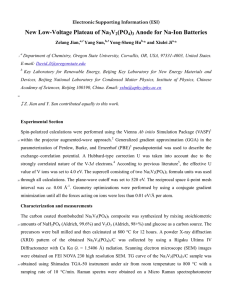Professional Mobile Radio for Public Protection and Disaster Relief TETRA a Digital Solution
advertisement

Professional Mobile Radio for Public Protection and Disaster Relief TETRA a Digital Solution JOINT ITU – ESCAP REGIONAL WORKSHOP ON DISASTER COMMUNICATION Patric Remus Senior Telecommunications Expert / Consultant Bangkok, 12th - 15th December 2006 Content 1. Communication reality in exceptional situations for PPDR operations 2. What are the communication needs for critical missions ? 3. Lessons learnt from critical mission communication of PPDR / PSS agencies 4. Proven standardized PMR systems - a solution for critical mission operations 5. Advantages offered by state-of-the-art PMR systems for disaster and emergency communication 6. Integration of complex PPDR / PSS communication systems is key for a secure, reliable and efficient operation 7. What are the recommendations for countries in Asia and the Pacific ? 8. Conclusions and key messages PMR - Professional Mobile Radio PSS - Public Safety and Security PPDR - Public Protection and Disaster Relief Patric Remus, Senior Telecommunications Expert Page 2 1. Communication reality in exceptional situations for PPDR operations Public communication systems are usually: z overloaded z collapsed z sometimes destroyed Communication resources are always urgently needed, but are never sufficient. It is often observed: z lack of resources and capacities z lack of communication disciplines no functional interoperability between involved agencies for PPDR / PSS z Command and control centers often do not even get the vital information. They suffer from: z missing of adequate resources z lack of organization & processes Patric Remus, Senior Telecommunications Expert Page 3 2. What are the communication needs for critical missions ? Strong lead of mission by Command and Control Centers / group leaders Availability of point to multi-point communication functionality Guaranty of fast and secure access to engaged mission forces Integrity of voice and data applications Prioritization of important users / data Securing fast and dynamic set-up of user groups Use of direct mode communication in case of missing radio coverage Introduction of proven critical mission procedures and processes Patric Remus, Senior Telecommunications Expert Page 4 3. Lessons learnt from critical mission communication of PPDR / PSS agencies Best solution is one secure common communication platform for all involved agencies Emergency communication networks should be: z under Government’s strict control and leadership z completely independent from other public communications, but offering interconnections to: • • • PABX POTS and GSM existing analogue radio systems Securing efficient communications through integration of multi-agency Command and Control Centers Availability of advanced voice and data services especially developed for PPDR / PSS applications Patric Remus, Senior Telecommunications Expert Page 5 4. Proven standardized PMR systems – a solution for critical mission operations Today standardized digital PMR systems are offered on a mature development state off the shelf to support PPDR / PSS multi-agency organizations Special PPDR / PSS applications are available and fully functional Therefore the transition from analogue to digital PMR has started and is fast increasing. Particular in Europe but also world-wide mayor efforts are made to establish efficient and secure critical mission services TETRA is the preferred and today leading technology standard but there are others like e.g. Tetrapol, APCO 25 The new PMR systems can be quickly deployed and put into operation. They are highly scalable in terms of size and capacity. TETRA and similar PMR and 3G systems are being evaluated under the Tampere Convention Patric Remus, Senior Telecommunications Expert Page 6 5. Advantages offered by state-of-the-art PMR systems for disaster and emergency communication Advanced PMR applications Advanced PMR services Group communication z Point to multi-point z Direct mode No eaves-dropping through encryption Closed user groups configurable Fraud protection High integration capabilities Interconnection to other communication networks Various data base queries Patric Remus, Senior Telecommunications Expert Automatic Vehicle / Person location GPS navigation Automatic data base queries WAP services Fingerprint and ID data transmission Various telemetry features Ambience listening Machine-to-machine communication e.g. for vehicle computers Automatic alarm notification - fast, immediate, nationwide - Page 7 6. Integration of complex PPDR / PSS communication systems is key for a secure, reliable and efficient operation The following steps are essential for a successful integration: Well planed integration of typically large scale PMR systems for PPDR operation consisting of numerous platforms and technologies Networks of high complexity require sophisticated planning and integration in the end-to-end view Step by step migration and prior integration of existing analogue PPDR / PSS systems and users Development and improvement of work processes is an integral part of a functional PMR system Patric Remus, Senior Telecommunications Expert Page 8 7. What are the recommendations for the countries in Asia and the Pacific? Implementation of truly multi - agency PPDR / PSS communication system is today an feasible option in the Asia and Pacific region Long term goal should be to migrate existing non- coherent analogue PPDR / PSS systems to one integrated digital PMR system Reduction of dependency on public communication systems Ideally disaster alarm systems should make use of nationwide PMR Existing Command and Control Centers for emergency and security should be integrated Note: PMR systems can also be of vital every day importance for PSS agency users like police, fire brigade, ambulances, rescue forces, social-health-communal and others services – financial benefit for agencies Patric Remus, Senior Telecommunications Expert Page 9 8. Conclusions and key messages 1. Fast introduction of an independent and publicly owned digital PMR system is today a well suitable and affordable solution for mobile communications of APAC‘s PPDR / PSS agencies 2. This solution shall ensure that forces, at any given time and situation, have the use of a functional and independent communication system available to do the best possible job 3. The technology is today available using mostly off the shelf components. The methods are available and if APAC government’s decides to use it, people will benefit from it ! Patric Remus, Senior Telecommunications Expert Page 10 Thank you for your interest! Patric Remus, Dipl.-Ing. Senior Telecommunications Expert Estermannstr. 138a 53117 Bonn / Germany Phone: +49 228 9737827 Mob Ph: +49 175 7226280 Mob Ph: +66 890 271650 Email: patric_remus@ gmx.de Patric Remus, Senior Telecommunications Expert Page 11





